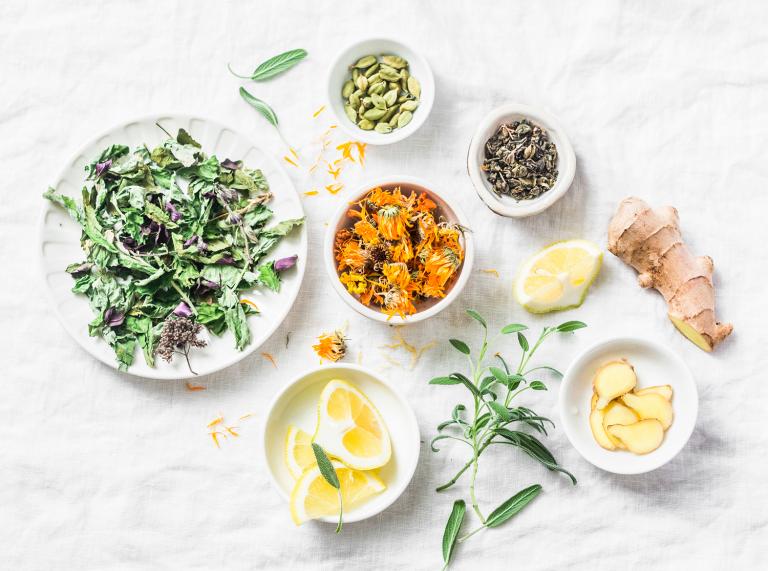Spring symbolizes a time for renewal. Historically, as bitter greens emerged from the snowmelt and humans dug for earthy roots, our seasonal diets would include more naturally detoxifying herbs and foods.
Nowadays, social media provides constant reminders that bathing suit season is not far away, and many people may be curious about trying a cleanse. Cleansing kits are easy-grab options for internal spring cleaning, but what’s in them, really? And how do you choose which one is best for you?
Detoxifying Foods
First, it’s important to note that the best way to encourage your body’s natural detoxifying processes is to eat a clean, plant-rich, fiber-rich diet with plenty of water.
- beets
- dandelion greens
- leafy greens
- lemon
- garlic
- ginger
- artichoke
- burdock
- green tea
- flaxseeds
Proper sleep also helps, as this is the time when your body does most of its detoxification.
Herbs for Your Detox Kit
The body is amazing in the cleansing it already does. While you don’t need to use a kit to detoxify, the herbs presented here can help enhance the body’s natural detoxification processes so you feel healthier and more vibrant.
You can also make or buy tea blends that include several of these herbs.
-
Colon Cleanse
Most cleanse kits—particularly those with “colon” in the title—will include laxative herbs and fiber. These ingredients allow waste to more effectively leave in the feces versus being reabsorbed in the intestines.
Natural Laxatives
-
Strong Laxatives
While they’re safe, they are habit forming and usually unnecessary.
- senna
- aloe latex
- cascara
- buckthorn
- rhubarb root
-
Mid-Range Laxatives
Mid-range laxatives tend to support elimination more gently without overriding the body’s natural mechanisms.
- magnesium
- triphala
- yellow dock
-
Fiber
Fiber can come from ground flax or psyllium seeds or high-mucilage herbs like slippery elm and marshmallow. Fiber’s an important part of a colon cleanse because it acts as a bulk laxative and also grabs hold of waste so it’s more effectively excreted through the feces.
A Word of Warning
Whether your cleanse kit includes laxatives, fiber, or both, it’s good to start with a low dose, and make sure you’re near a toilet for the first few days. Different people have varying responses to the laxative actions. Some people have zero uptick on bowel movements on the strongest laxatives while others need to run to the bathroom after just a smidge of fiber or triphala.
-
-
Liver Cleanse
Your liver is a key detoxifying organ: It constantly filters the blood and excretes the waste in the form of bile via your digestive system and feces.
-
Milk Thistle
Most whole body and liver cleanse kits will contain milk thistle, an important herb for protecting and regenerating the liver.
-
Herbs for Bile
Bitter and sour-tasting herbs—including artichoke, dandelion, and yellow dock—encourage the liver to detoxify more effectively, “moving” the liver to create and excrete more bile.
Schisandra and turmeric both protect and “move” the liver.
-
Fiber
Fiber helps grab onto bile to improve its elimination.
-
-
Kidney Cleanse
Your kidneys help maintain fluid balance and filter different types of toxins from the body, excreted through the urine.
Kidney cleanses are not to be used during kidney disease, infection, or stones (which usually require immediate medical attention and may be worsened by some kidney-cleansing herbs).
Some herbs can encourage the kidneys to remove more waste and urine from the body via cleansing and diuretic actions. You’ll often find them in kidney cleanse kits and in whole-body cleanse kits.
- cranberry
- tart cherry
- parsley
- celery
- dandelion leaves
- corn silk
- marshmallow
- juniper
- nettle
Hydration is important to aid this process.
-
Lymph Cleanse
Your lymph system is very important for filtering the interstitial fluid that resides outside cells and the bloodstream.
You’ll often find lymph-moving herbs whole-body cleanse kits.
- burdock
- calendula
- red root
- echinacea
- red clover
-
Parasite Cleanse
Parasite cleanses contain herbs that discourage yeast, worms, pathogenic bacteria, and other nasties. A low-sugar diet is usually also recommended.
- pau d’arco
- black walnut hull
- berberine-rich herbs
- wormwood
- quassia
- garlic
- neem
- cloves
Seek a Professional
If you think you have parasites, contact a skilled practitioner for testing to confirm and identify which kinds are at play so you can better target your approach.
While herbs might help with candida, dysbiosis, or parasites, the best herbs for the job can differ.
Some antiparasitic herbs might be unhealthy for you to take if you don’t have parasites, or they might be ineffective.

